Sustainability
GO GREENER
OneLiving are committed to sustainability and doing our part for the environment. We are working hard to reduce our greenhouse gas emissions and working towards becoming a Zero Carbon student operator with our Net Zero Strategy.
Did you know? Widespread research places 73% of the world’s climate change crisis with the manufacture and consumption of energy – Join us in reducing CO2 emissions by using less energy during your stay… YOU have the biggest influence on reducing your impact on the environment – Here are some effortless things you can do to help be a positive influence and reduce our collective impact on the environment.
Below, we breakdown some of the main ways you can live more sustainably. These topics could each have many pages of their own, but we have kept it simple and given you the highlights. Tips are highlighted in bold. Look out for upcoming blogs, articles, workshops, newsletters with more on all these topics coming soon…
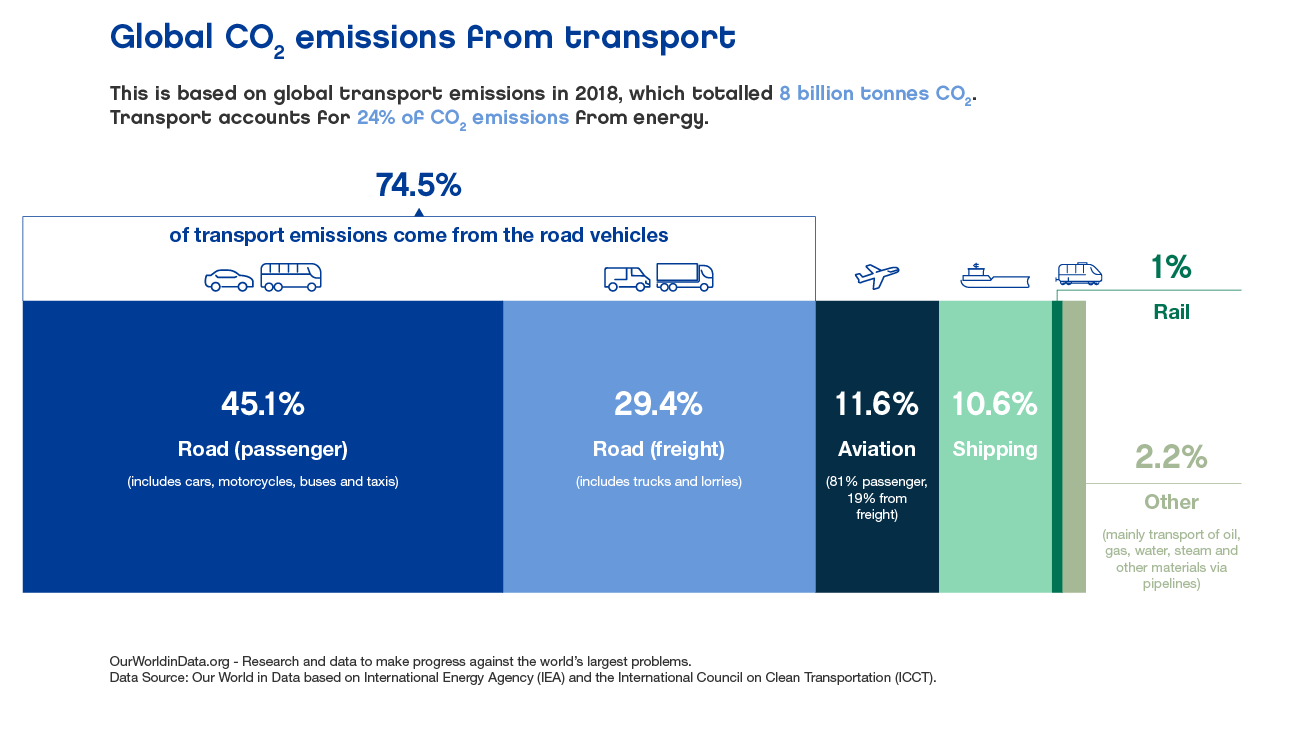
Figure 1: Global transport emissions by category. Source: OurWorldInData.org
1. TRANSPORT – Walk or cycle around the city.
Did you know? Despite rapid increases in CO2 emissions from ships and planes, road vehicles continue to account for three-quarters of transport emissions.
Walk, cycle, skate around the city, this way, you get your exercise in while helping the environment… Consider taking the bus or train if you need to travel somewhere far instead of driving or taking a taxi (rail travel accounts for 1% of travel emissions).
Travel less if possible, such as having a video call instead of travelling in person just for one quick conversation. Even things like taking the stairs instead of using the lift if you are capable and especially on lower floors.
2. ENERGY USAGE – Turn it off.
Did you know? 73% of the worlds greenhouse gas emissions comes from the production and usage of energy…
Remember to turn off unnecessary lights, turn off appliances and anything that doesn’t need to stay on.
Natural light is not only great for your wellbeing but can be harnessed. There’s no need to have lights on in the middle of the day when you can’t notice the difference with them off. Use task lighting for specific purposes for example using a lamp to read a book and not the main lights (this can also help with your sleep, talked about in – 9. Wellness).
Unplug unused appliances, standby can account for up to 10% of energy use. Manage your thermostat, turn the heating off when you reach a nice temperature and keep the heat in. Certainly, don’t leave your heating on then open a window because it’s too hot.
Even if money is not your motive think about the environmental or social effects of your actions, such as climate change. Use a drying rack for your laundry, this can save a lot of energy and money on drying machines.

Figure 2: Effects of climate change on land and lakes on Iberian Peninsula. Source: NASA.gov

Figure 3: Food waste facts. Source – Soapboxproject.org
3. FOOD WASTE – Sustainable food practices.
Did you know? Around 1/3 of food globally is wasted, and with just half of that waste we could give everyone on the planet food security…
Plan ahead, when going to the shops or when you go away so you don’t waste food. Eat the whole foods (also benefits 9. wellness), consider using peels for soups and bones for stocks and broths.
Optimise your storage, don’t forget that pepper at the back of the fridge. Buy local and seasonal produce to reduce food miles, support local and have the most nutrient dense food available (also benefits 9. wellness). Use your freezer for things like bread or anything you know you can’t eat in time. Eat more veg, bulk up meals with nutritious veg which on average has a much lower carbon footprint then animal products. Share the food you don’t use, with neighbours or using apps such as OLIO. Buy from farmers markets or farmers box schemes. Buying organic, pasture raised, sustainably caught or produced food helps support the environment and reduce negative impacts if you have the option.
4. BAGS & SINGLE USE PLASTICS – Reuse.
Did you know? The number of single use plastic bags sold in the UK went from 2.12 billion in 2016/2017 to 488 million in 2020/2021 due to the introduction of a bag tax.
Make sure to use reusable bags. Bags for life are great, so are any bags you can reuse repeatedly. Even standard supermarket bags will be replaced by most supermarkets when they break. Get out of the new bag for each shop habit.
There are ongoing debates over which type of bag is the most sustainable. Regardless of if the bag is paper, plastic, cotton or another material, the most sustainable choice is reusing the bag you have. In every study for every type of bag, it is clear, that reusing the bag as many times as possible reduces its environmental impact. In summary, making effort to reuse any bag that you end up with and disposing of the bag responsibly, is the key.
Single-use plastics are a clear example of our throwaway culture. Instead of investing in quality products that will last, we often prioritize convenience over durability and sustainability. Our reliance on plastics means we are accumulating waste at a staggering rate. We produce 300 million tons of plastic per year worldwide, half of which is single-use. That is equivalent to the weight of the entire human population.
Being conscious about decisions you make around single use plastics is the best thing you can do, some top tips are listed below:
- Always pack a reusable bag
- Cook more, takeaway less. This way you can control the plastics you use. (Reuse takeaway containers if you do have one)
- Buy in bulk instead of buying many individual packs of things. You could bring reusable fruit and vegetable bags and buy loose fruit and veg.
- Avoid plastic wrap and use reusable containers instead.
- Buying products in person from shops instead of online shopping can reduce single use plastics used for delivery. (If you do shop online, recycle all the packaging you can)
- Buy a reusable straw and have reusable cutlery for sustainable eating on the go. (This way you can say no to plastic alternatives used at many places)
- Speak out, campaign and petition for less single use plastic and big companies to stop using so much plastic.
- Let your favourite companies know you like their products but would love to see more sustainable packaging.
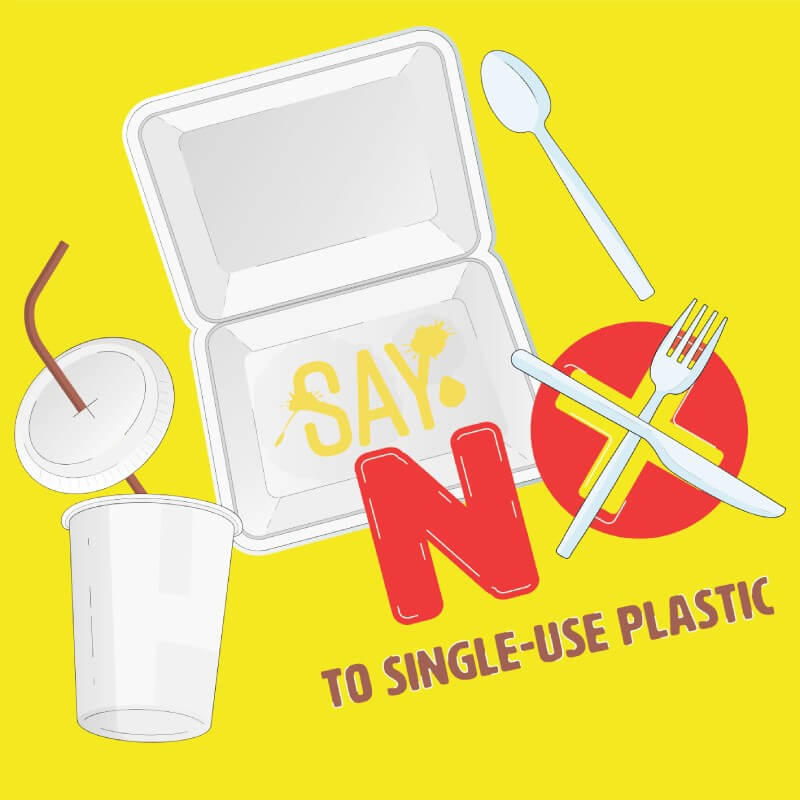
Figure 4: Say no to single-use plastic.
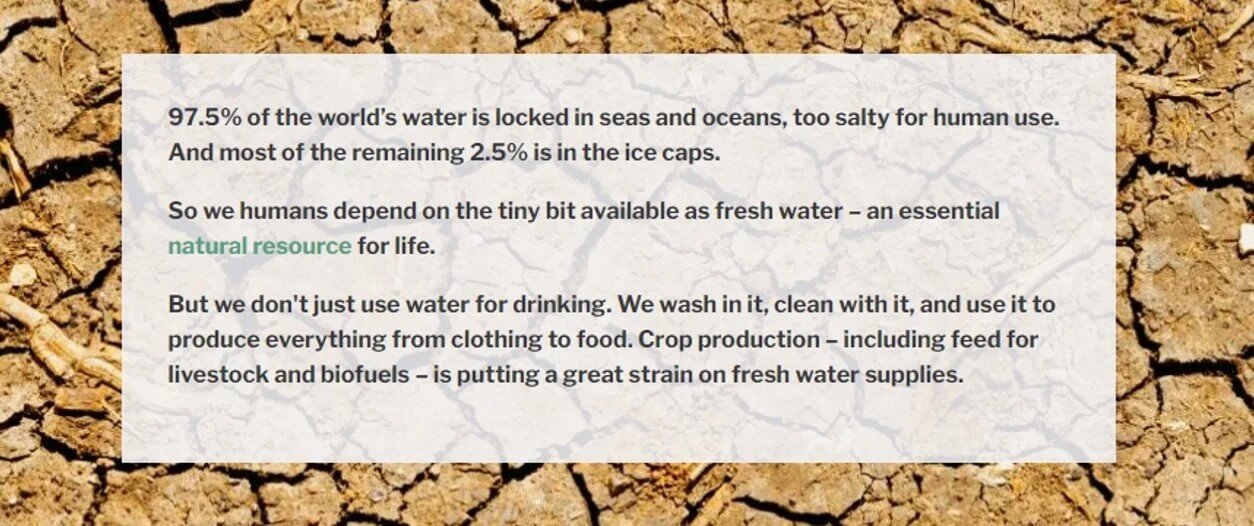
Figure 5: Stats on water use worldwide. Source – Friendsoftheearth.uk
5. WATER – Reduce Water waste.
Did you know? Even with a low flow shower, a 5-minute shower uses around 45 litres of water (That’s 22.5 big 2 litre bottles).
So maybe try contemplating life outside the shower. Try to reduce wasting water by turning off the tap when brushing your teeth, shaving, washing the pots. A running tap uses up to 9 litres of water per minute. The theory is simple for this topic, just use less water…
Try using a bowl in the sink when washing the dishes or when washing fruit and veg.
Fill a jug of water and leave it in the fridge for when you want a cold drink instead of running the tap until its cold for every drink.
Be efficient when washing clothes or using a dishwasher and wait till you have a full load.
Shower instead of using a bath, showers use around half the water of a bath.
Report any leaking taps to your maintenance team. A dripping tap can waste over 110 litres of water in a week.
6. CIRCULAR ECONOMY – Circulate it.
Did you know? Currently, our world economy is only 9.1 percent circular, leading to a massive circularity gap. Our society has been based on a linear system when it comes to resources and how they are used. This means we have a system built on natural resource extraction, product creation and then these products are mostly thrown away. However, since we have all become more concerned about sustainability there is a desire to move towards a ‘circular economy’.
This is where natural resources are extracted (only, when necessary, as in when we can’t source them from recycled materials), turned into products (which are designed to be reused/recyclable), then the products are used to their maximum potential, then at the end of their lives they are repaired, sold, recycled, or redistributed within the system. This further reduces the demand for extracting more natural resources.
This kind of thinking has become more common with things like water bottles, coffee mugs, vegetable bags but also things like clothes, furniture, technology. If you can re-use it or pass it on, then you can save the energy and material involved with making a new one.
For example:
- Bring a re-usable travel mug to your favourite coffee shop or keep a reusable water bottle topped up so you don’t need to buy any extra bottles while you’re out.
- Say no to fast fashion. Think about the option of buying vintage or second-hand clothes from places like Depop or Vinted.
- Borrow, lend, lease and share. Things like trading furniture or anything else through apps like Gumtree or OLIO.
- Support sustainable brands.
- Practice zero waste habits.
- Upcycle and DIY.
- Invest in higher quality products that will last.
- Get creative while getting out of our ‘waste culture’ mindset.
Good news. In the UK more people own and regularly use a reusable water bottle (36%) than didn’t have one (34%) … Get on board!

Figure 6: Circular economy graphic. Source – European Parliament
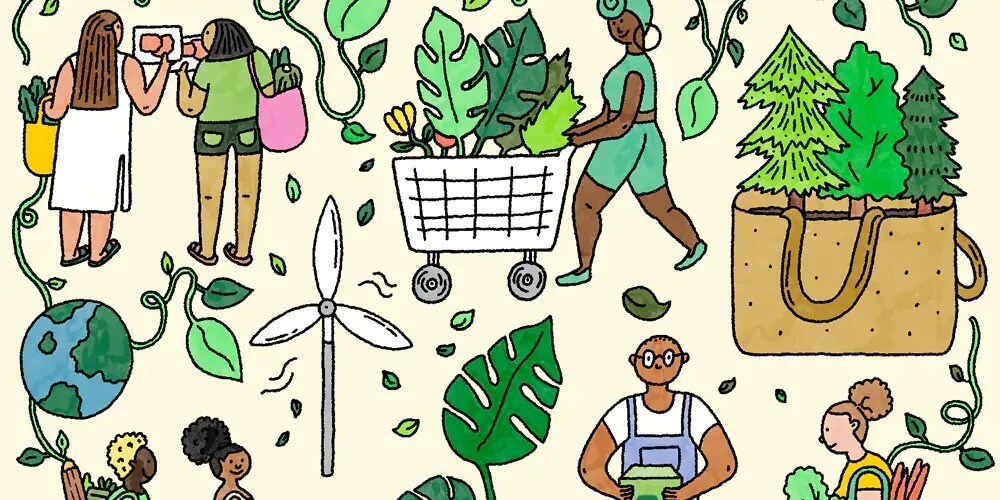
Figure 7: Eco consumer illustration. Source – Hyesu Lee
7. ENVIRONMENTALLY FRIENDLY PRODUCTS – The rise of the Eco-Friendly consumer.
Did you know? In 2019 37% of people said they look for products with environmentally friendly packaging. More recent studies suggest this figure is now closer to 57%.
Try out some environmentally friendly/ sustainable options and avoid outdated and unsustainable products. This can include any eco products from toothbrushes, cleaning products, detergents, to an organic cotton t-shirt. Companies are catering to the public’s demand for more environmentally responsible products. Vote with your money and stop buying things that are usually produced in unsustainable ways, such as: palm oil (unless sustainable guaranteed), plastic linked cans of alcohol (the old school 6-pack link for cans that animals get stuck in) and unsustainably caught fish. Instead look for environmentally conscious products and companies to support. Look out for companies that ‘greenwash’ or pretend to be sustainable by using clever wording or being vague.
The barriers to entry when it comes to sustainable consumerism that sceptics bring up are: price being too high (44% said this), lack of quality, limited product availability, lack of time to seek out these options. These are all valid points in certain scenarios but here are some ways around these issues.
For price, simply make the best decision you can make considering your own budget. There are many great products out there that compare in price, however, bear in mind that usually there are reasons certain things can be so cheap. This can be due to cutting costs no matter the impact on the environment or the people they source products from including forms of modern slavery or unfair trade.
As for limited availability try looking in local eco conscious shops, larger shops or online. If time is an issue, then you don’t have to worry about everything at once. Just pick one product at a time and look at different options. Once you find a great product or company for your sustainable goods then you can stick with it, knowing you’re doing a great thing. If you are worries about quality, try checking reviews if you can online or try a variety of new products and compare them yourself.
8. WASTE MANAGEMENT – Reduce, Reuse, Recycle.
Did you know? Over 2.8 billion parcels were sent throughout the UK last year, creating a whole lot of packaging. Fortunately, most modern packaging materials are 100% recyclable, and paper and cardboard are the things we recycled most in 2021.
It is nice to know the UK is in the top group of recyclers (16th globally), while leaving room for improve still (Wales sets the example being 3rd. Just behind Germany and Singapore).
So how can we all be better at reducing our environmental impact due to waste?
As the old slogan says Reduce, Reuse, Recycle. Try your best to reduce waste in the first place, then things you can reuse keep for later. Anything that is left or has reached its maximum use for example if a bag breaks, then go and recycle it correctly. For example, this could take the form of being more prepared with food shopping, bringing your own bags to reuse, not buying things you won’t use, then making sure you use as much of that food as possible then recycle/dispose properly of the packaging that is left.
This could also look like, think before you print. Reducing the amount you print, reuse any spare paper and then recycle what is left!
Here are the top tips from some recycling experts regarding the common issues they see:
- Don’t put your recycling inside plastic bags (they get tangled in the machines) instead just empty the bag directly into the recycling bin and save the bag to reuse.
- Stop ‘Wishcycling’ if in doubt leave it out. This is when you optimistically put something in the recycling that cannot be recycled. This can contaminate entire loads.
- Anything that has food waste etc on should be rinsed so it is clean of residue otherwise it can contaminate other items and cause rejections of full loads. Things don’t need to be squeaky clean and washed but just free from residue.
- Read the label, it if doesn’t state and you can’t work it out with a quick google search then leave it out.
- Combined materials are trash, common items are coffee cups that have plastic interiors and cardboard exteriors, crisp packets, sandwich boxes or anything with multiple materials in one that can’t be separated.
- Very small things can cause problems, recycle bottles with lids on.
- Crush your boxes and bottles to leave more room for other recyclables.
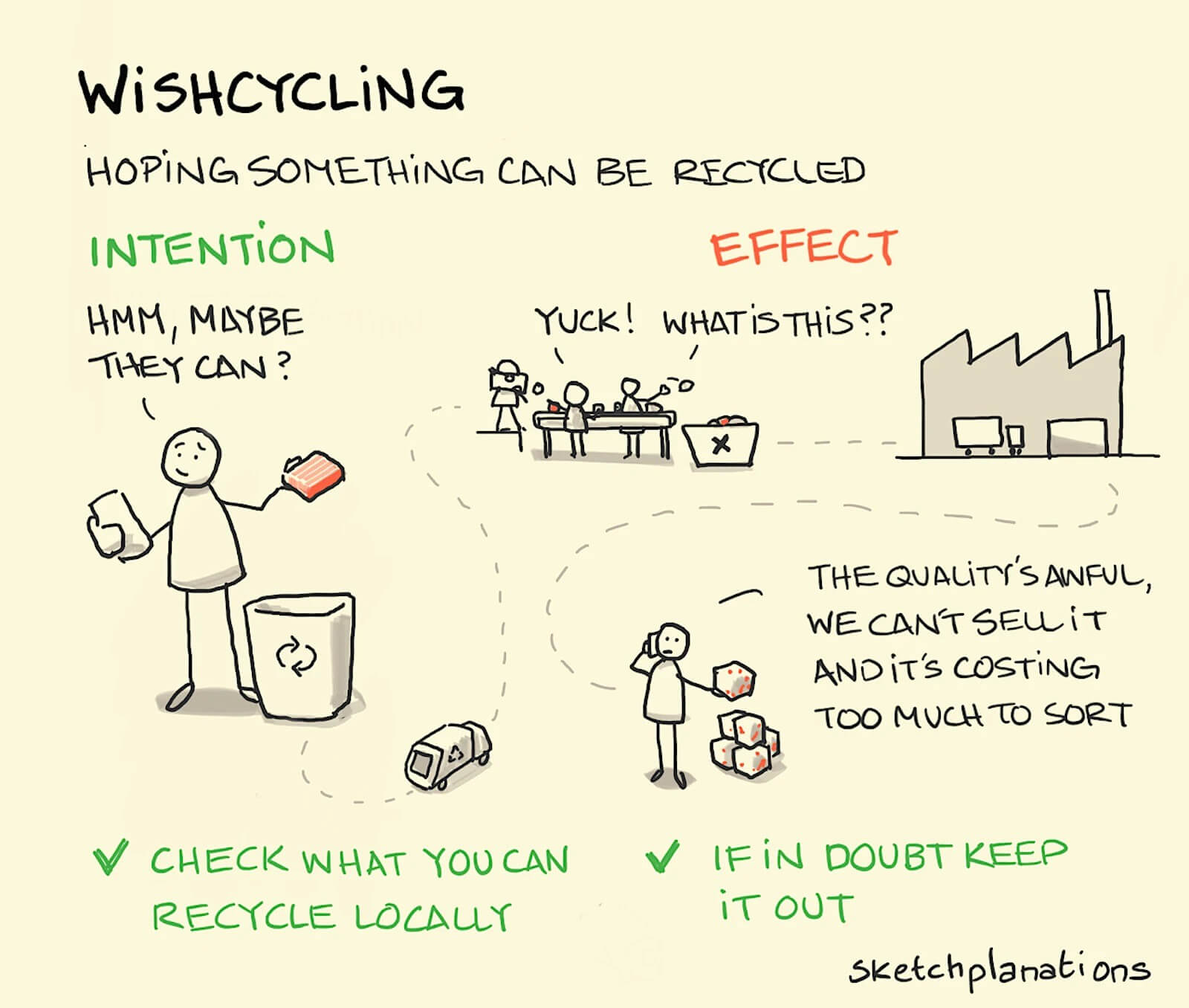
Figure 8: Wishcycling sketch. Source – Sketchplanations.com

Figure 9: Wellness graphic. Source – Blog.csun.edu
9. WELLNESS – Mind, Body Spirit.
Did you know? In the UK 37% of people say they never exercise or play sport, and just over half (51%) of global shoppers say their concerns over health and safety outweigh their sense of environmental responsibility.
You might ask what your health has to do with sustainability. Everything. Sustainability of people’s health is just as important as environmental sustainability. If your basic needs aren’t met and you haven’t got enough energy to do the things you need to do, then how will you have any energy or desire to live a more sustainable life.
You should look after yourself first and foremost and let that flow into other aspects of your life. Whether you have never done much exercise or are an athlete, you can always start somewhere and progress. Even if that means taking a 5-minute walk or anything active you might enjoy, finding something you enjoy is key, then from there trying to progress just a little each time. If you improved 1% each day, that is a 100% increase within just over 3 months.
Health doesn’t just relate to the topic of movement/fitness but to many things which come under the umbrellas of nutrition/diet/hydration, mental health/happiness/motivation, your environment and ability to rest/relax/recover.
With nutrition think whole foods the less processed the better, eat what makes you feel satisfied yet energised consistently. Get experimenting in the kitchen. Listen to the signs your body gives you, it’s wise!
Mental health can be difficult and unique to each person but talking with the right people is always a good step. Each of our Property Managers are mental health first aiders. There is also a great resource all our students have access to in the form of Student Minds.
Like anything you can only get out what you put in. How long would you last without sleep, a few days, maybe a week? This demonstrates the importance of getting rest, it is a vital part of our health. Sleep quality is important, having consistent sleep routines will help sleep quality. Working out early in the day and getting outside in bright light early in the day and reducing light later in the day have been shown to have many benefits on sleep consistency and quality.
Remember to wind down and reduce stress, this can be done any time of day through simple breathing practices, yoga, meditation, reflection, journaling, going to a park or anything you find relaxing.
We hope you have learned some new ways to have a positive impact on your health, the health of our environment, people around you and be a FORCE FOR GOOD.
Look out for upcoming blogs on this page with more detailed information and the science around all these topics and more…
